#kobani questions
Text
An Introduction to Myself and My WIP!

Hello everyone! A confession, this is actually a re-introduction. I've been here on Tumblr for a little less than a year now, but I haven't been the best about being active, life just sort of got in the way. As such I would like to reintroduce myself and what I've been working on.
For the purposes of Tumblr and in the interest of privacy you can call me C. I am in my mid-twenties, I use he/him pronouns, and I am happily married to my partner, who is also a C. I am queer, as is my partner. I enjoy cooking, fishing, Dnd(ing?), reading, and of course writing.
We both originally come from the US but we are currently living on the east coast of Scotland as I pursue my Msc in Archaeology.
I am trying to be a bit more active on here and I am always open to things like tags and asks, even if it takes me a bit to respond.
I think that's about it for me, and so without further ado let me introduce or reintroduce you to my WIP.
Testaments of the Green Sea
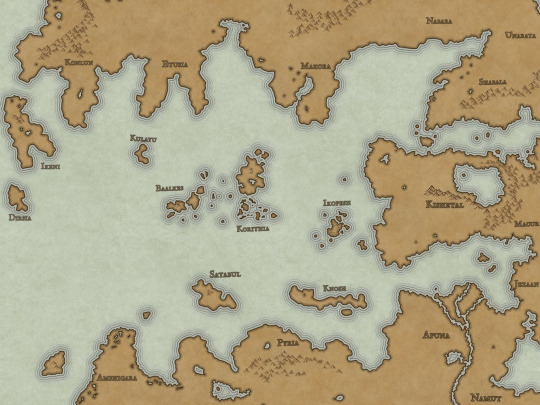
Genre: Epic Fantasy
Themes and Tropes (Or more accurately a random assortment of words vaguely related to the plot): Found Family, immortality, loss, love, war, power, memory, magic, insanity, The passage of time, growing up, queerness in the ancient world, violence, spirits, fantasy outside of medieval europe
Summary: Book one of the Testaments of the Green Sea (The lands of the Green Sea are pictured above) follows the journeys of the giant slave Narul and the princess Ninma.
After unexpected tragedy forces the two to flee from the Great city of Labisa, they find themselves on a journey which carries them across the ancient lands of Kishetal. Along the way they encounter spirits, demons, war, gods, pirates, and slavers.
TW for death/grief, violence/blood/gore, mental illness, physical illness, abuse, and cannibalism, awkward queerness, secondhand embarrasment etc, etc.
Excerpt( First Paragraph of Chapter 1):
The blood dripped into the awaiting bowl, painting its alabaster walls crimson. The slave watched the dark liquid trickle down his arm, skirting past the hairs, rolling veins, and moles. Even after these twenty years of weekly blood lettings, he could not shake a creeping feeling of unease as his eyes followed the sanguine river creeping its way across his arm. His own face gazed back at him from the scarlet pool. He could not meet his own eye, could not stand to look that creature. He turned away.
Draft Status: The second draft of the manuscript is currently being edited, I will be looking for my first round of Beta Readers likely before the end of the year.
This is just part one of a much larger series. My partner is currently working on the beginnings of their own series, set in the same world but 3,000 years in the future, roughly aligning with our own Great War Period.
I'm so excited to share more with you, and I love answering questions!
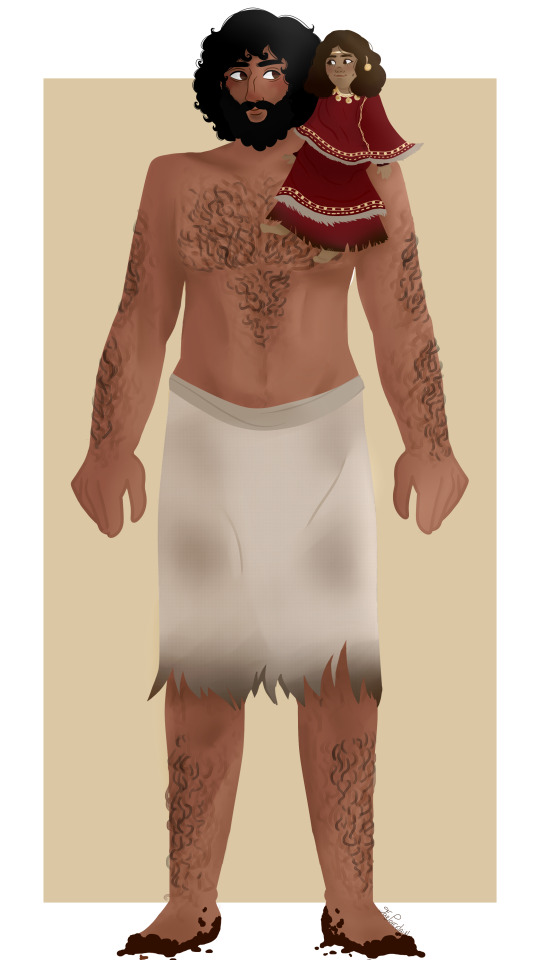
Narul and Ninma courtesy of @faeporcelain
#world building#fantasy#fantasy writing#queer fantasy#worldbuilding#fantasy world#testamentsofthegreensea#narul#fantasy worldbuilding#writing#wip#current wip#kobani questions#fantasy map#if y'all have any questions please ask!#ask#send asks
98 notes
·
View notes
Text
*Syrian Kurdish commander says Kobani likely target of threatened Turkish ground offensive
Following Turkish airstrikes on his main headquarters in northeast Syria, SDF commander Mazlum Kobane talks with Al-Monitor about Erdogan's threats of a new ground offensive.
Al-Monitor: Why is Turkey attacking you so intensively at this particular time?
Kobane: Turkey is opposed to gains by any Kurds, be they in Syria, Iraq, Iran or inside Turkey itself. Turkey wants to destroy our autonomous administration. That’s its overarching goal. But most immediately there is the question of elections in Turkey. Though these attacks, Erdogan and his government are laying the ground, setting the public mood for the forthcoming elections.
Link : https://www.al-monitor.com/originals/2022/11/syrian-kurdish-commander-says-kobani-likely-target-threatened-turkish-ground#ixzz7lRzn9Ca0
Image from the text of the article.
*Suriyeli Kürt komutan Kobani'nin Türkiye'nin kara harekatı tehdidinin hedefi olabileceğini söyledi
Türkiye'nin Suriye'nin kuzeydoğusundaki ana karargâhına düzenlediği hava saldırısının ardından SDG komutanı Mazlum Kobane, Erdoğan'ın yeni bir kara harekâtı tehdidini Al-Monitor'a değerlendirdi.
Al-Monitor: Türkiye neden tam da bu dönemde size bu kadar yoğun saldırıyor?
Kobani: Türkiye ister Suriye'de, ister Irak'ta, ister İran'da, ister Türkiye'nin içinde olsun Kürtlerin kazanımlarına karşı. Türkiye bizim özerk yönetimimizi yok etmek istiyor. Bu onun genel amacı. Ama en önemlisi Türkiye'deki seçimler meselesi. Erdoğan ve hükümeti bu saldırılarla önümüzdeki seçimler için zemin hazırlıyor, kamuoyunun havasını belirliyor.
Makale metninden görüntü.
*シリアのクルド人司令官は西クルディスタン(シリア北部)コバネーがトルコの地上攻撃のターゲットになる可能性が高いと語る。
トルコによるシリア北東部の司令部への空爆を受け、シリア民主軍のマズルム・コバネー司令官が、新たな地上戦の脅威についてアル・モニターに語っている。
アル・モニター:トルコはなぜ、この時期にこれほどまでに集中的にあなた方を攻撃しているのでしょうか。
コバネー(敬称略):トルコは、シリア、イラク、イラン、トルコ国内を問わず、あらゆるクルド人による利得に反対しています。トルコは私たちの自治行政を破壊したいのです。それが彼らの包括的な目標です。しかし最も直接的な問題は、トルコにおける選挙の問題です。
今回の攻撃で、エルドアン大統領とその政府は来るべき選挙のための基盤を築き、国民のムードを作りつつある。
アル・モニターより記事一部抜粋ー訳+画像とも

2 notes
·
View notes
Photo

#CorpMedia #Idiocracy #Oligarchs #MegaBanks vs #Union #Occupy #NoDAPL #BLM #SDF #DACA #MeToo #Humanity #DemExit #FeelTheBern
Syrian town struggles to cope alone after key victory over Islamic State [UPDATES]
https://www.reuters.com/article/us-mideast-crisis-syria-kurds-idUSKBN1CK0AQ
Islamic State’s defeat in predominately Kurdish Kobani in early 2015 helped turn the tide against the ultra-militant group and marked the start of a more open U.S. military relationship with the Kurdish YPG militia...

RELATED: Battle for Kobane: Key events
https://www.bbc.com/news/world-middle-east-29688108

RELATED UPDATE: Turkey’s Dangerous New Exports: Pan-Islamist, Neo-Ottoman Visions and Regional Instability
https://www.mei.edu/publications/turkeys-dangerous-new-exports-pan-islamist-neo-ottoman-visions-and-regional

RELATED UPDATE: Turkey’s Relationship with ISIS Proves It Is Deserting Its European Allies
https://besacenter.org/turkey-isis-relationship/
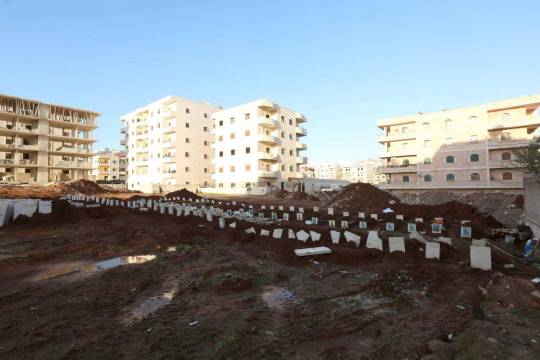
RELATED UPDATE: Turkish forces make false claims about YPG grave
https://npasyria.com/en/62387/
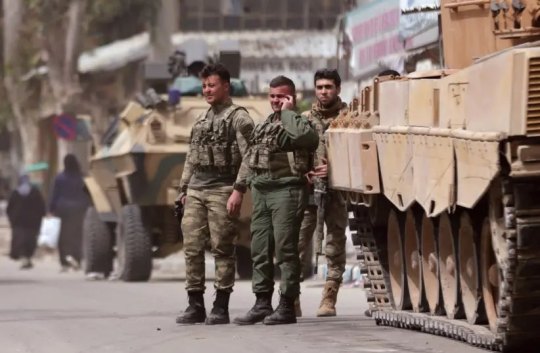
RELATED UPDATE: Turkey accused of bulldozing cemetery to create 'mass grave' - analysis
https://www.jpost.com/middle-east/turkey-accused-of-bulldozing-cemetery-to-create-mass-grave-analysis-674145

RELATED UPDATE: Erdogan to steal more of Syria? Al Jazeera floods the world with racist and genocidal Turkish/Qatari propaganda
https://thefreeonline.com/2021/10/12/al-jazeera-floods-the-world-with-racist-and-genocidal-turkish-qatari-propaganda/

RELATED UPDATE: Turkey Helps ISIS Attack Rojava
https://www.thenation.com/article/world/turkey-isis-rojava-prisoners/

RELATED UPDATE: Islamic State leader killed during raid by US special forces in Syria
https://www.theguardian.com/world/2022/feb/03/us-special-forces-kill-suspected-jihadists-in-north-west-syria-raid

RELATED UPDATE: Resurrecting terror in the AANES: Turkey’s ISIS prison riot in Hesekê
https://anfenglishmobile.com/features/resurrecting-terror-in-the-aanes-turkey-s-isis-prison-riot-in-heseke-57981

RELATED UPDATE: UN report indicates al-Qaeda and ISIS enjoy safe haven in Turkish-controlled Idlib
https://nordicmonitor.com/2022/02/the-un-report-indicates-al-qaeda-and-isis-enjoys-safe-haven-in-turkish-controlled-idlib/
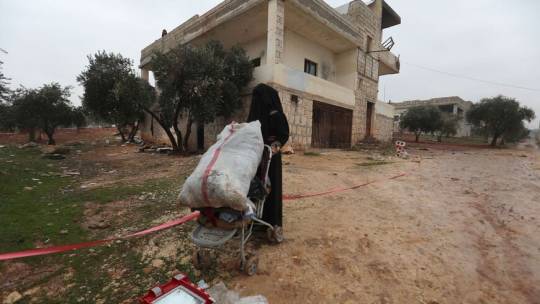
RELATED UPDATE: US raid raises questions on Turkey’s commitment vs. Islamic State
https://www.al-monitor.com/originals/2022/02/us-raid-raises-questions-turkeys-commitment-vs-islamic-state

RELATED UPDATE: The killing of Qurayshi: Are Turkey and ISIS still bonded?
https://ahvalnews.com/turkey-islamic-state/killing-qurayshi-are-turkey-and-isis-still-bonded
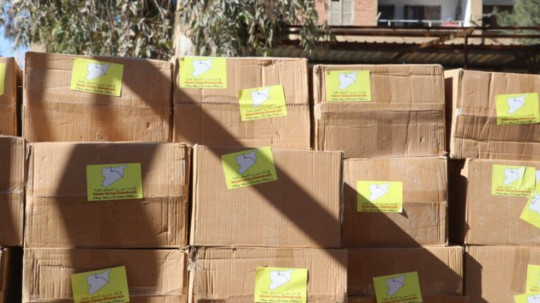
RELATED UPDATE: SDF provides humanitarian assistance to people affected by ISIS prison attack
https://anfenglishmobile.com/rojava-syria/sdf-provides-humanitarian-assistance-to-people-affected-by-isis-prison-attack-58095
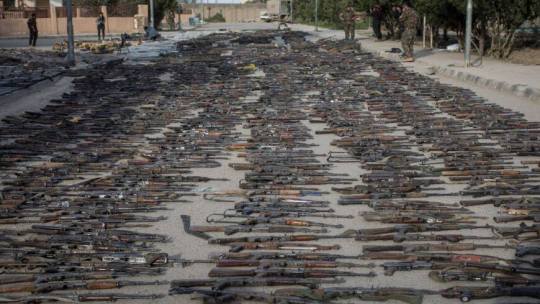
RELATED UPDATE: Islamic State collaborators received Turkish citizenship, official report shows
https://www.al-monitor.com/originals/2022/02/islamic-state-collaborators-received-turkish-citizenship-official-report-shows

RELATED UPDATE: SDF frees young Yazidi woman before ISIS mercenaries managed to take her to Turkey
https://anfenglishmobile.com/women/sdf-frees-young-yazidi-woman-before-isis-mercenaries-managed-to-take-her-to-turkey-58197

RELATED UPDATE: SDF arrests two ISIS members
https://anfenglishmobile.com/rojava-syria/sdf-arrests-two-isis-members-58215
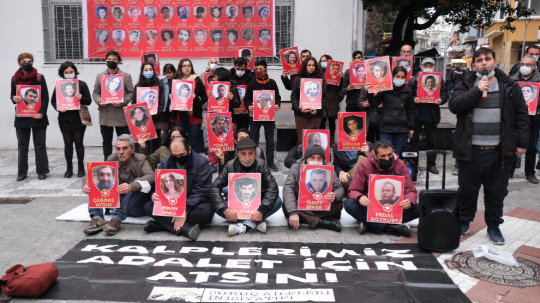
RELATED UPDATE: Suruç Families Initiative demands justice on 79th month since the Suruç Massacre
https://anfenglishmobile.com/human-rights/suruc-families-initiative-demands-justice-on-79th-month-since-the-suruc-massacre-58263

RELATED UPDATE: Appeals court upholds prison sentence for Demirtas
https://anfenglishmobile.com/news/appeals-court-upholds-prison-sentence-for-demirtas-58274
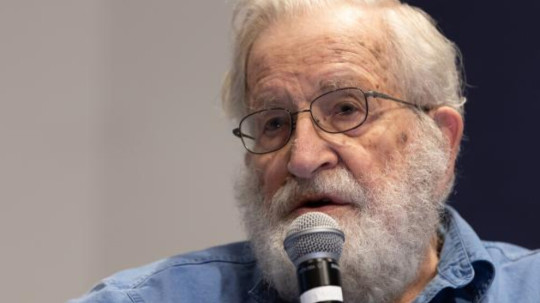
RELATED UPDATE: Noam Chomsky speaks about the Kurdish question today
https://anfenglishmobile.com/news/noam-chomsky-speaks-about-the-kurdish-question-today-58280
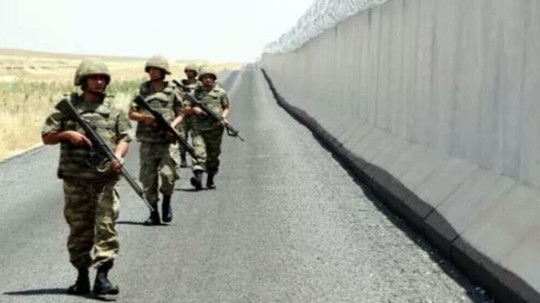
RELATED UPDATE: Turkish border guards kill old man working in Idlib countryside, SOHR reports
https://anfenglishmobile.com/rojava-syria/turkish-border-guards-kill-old-man-working-in-idlib-countryside-sohr-reports-58288
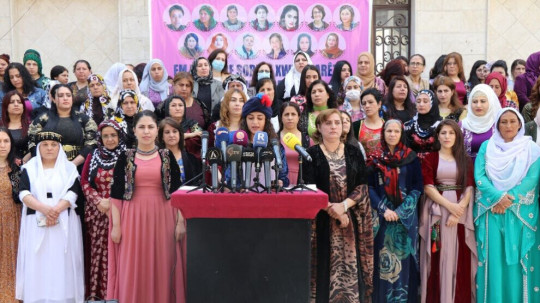
RELATED UPDATE: Women launch activities for 8 March in North-East Syria
https://anfenglishmobile.com/women/women-launch-activities-for-8-march-in-north-east-syria-58315
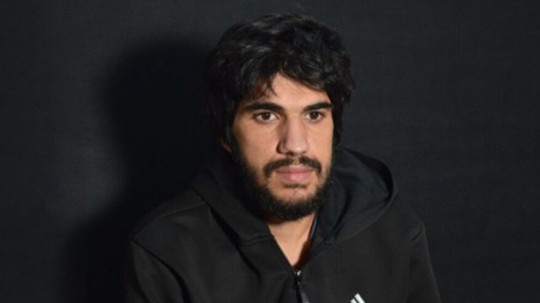
RELATED UPDATE: SDF Special Units arrest Iraqi ISIS terrorist trying to cross into Turkey
https://anfenglishmobile.com/rojava-syria/sdf-special-units-arrest-iraqi-isis-terrorist-trying-to-cross-into-turkey-58322
1 note
·
View note
Text
Defending Afrin
Turkey's war on Afrin is an attack not only on Kurdish self-determination, but on democracy and women's liberation in the Middle East.

Kurdish YPG fighters in Afrin, northern Syria. KurdishStruggle / Flickr
When thousands gathered in Afrin for the funeral procession of Barin Kobani, a woman fighter of the Kurdish Women’s Protection Units (YPJ), whose lifeless body was mutilated by Turkish-backed jihadist mercenaries, olive branches were reaching out of the crowd. Afrin, located at the Syrian-Turkish border and in the center of Mount Kurd, is not only known for its predominantly Kurdish population but also for its olive groves and blooming fields, surrounded by a mountainous landscape. For more than two weeks now Turkish tanks and fighter jets, accompanied by bearded men shouting “God is great” and raising their index finger, have been attacking civilian neighborhoods and positions held by the Kurdish-led Syrian Democratic Forces (SDF) in what Turkey has cynically named “Operation Olive Branch.”
According to a World Health Organization report, eighty-six civilians — including a whole family of seven — have been killed, along with two hundred wounded. More than ten thousand fled due to the bombings in one week. Kurdish sources such as the Administration of Afrin Canton Council and the head of the Afrin hospital however say the number is even higher. Turkish attacks in Afrin, which have also struck ancient sites, explicitly breach international law. Yet since the beginning of the first attacks on January 20, no outrage against this military aggression has been vocalized by a government or the international community.
“Kurds have no friends but the mountains” has become an easy refrain over the years to respond to the injustices the Kurdish people have been subjected to. But, after more than a century of atrocities, the Afrin assault still feels particular and urgent, an opportunity for meaningful solidarity before all democratic accomplishments in Northern Syria are destroyed by Turkey, her jihadist foot-soldiers, and the imperial powers. The Afrin crisis has emerged as an epitome of the region’s predicament and raises three fundamental questions: What is Turkey’s role in the historical oppression of Kurds in the region? Who today challenges them as the defenders of Afrin? And what are the geopolitics of the conflict?
Erdoğan’s Targets
Whenever the Turkish government launches an “operation,” especially an “anti-terror operation,” you can be certain that Kurds will be the first ones in the crosshairs. After the June 2015 elections, when Erdoğan’s Justice and Development Party (AKP) lost the majority it needed to form a government on its own, snap elections were announced for November 1. In the meantime, the peace process with the Kurdistan Workers’ Party (PKK) was terminated and a state of emergency declared in the country’s Kurdish southeast. The government, hand in hand with the military, launched so-called “cleansing operations” against supposed PKK members and targeted strongholds of the People’s Democratic Party (HDP), a left-wing alliance with its roots in Kurdish politics and effectively the only challenger of the AKP, in an act of collective punishment. A sizeable death toll and significant displacements were the consequence.
About this time two years ago, on February 5, the AKP government revealed a ten-step action plan to “repair” southeastern Turkey, which had been destroyed in the wake of the siege (or, as then-Prime Minister Ahmet Davutoglu would have it, was “traumatized by terrorists who started the fire”). This post-operation “master plan” included consultations with village guards that function as pro-government militia and the construction of bulletproof security towers in urban districts. It was, in reality, just another phase of the warfare, an attempt at tearing local residents from their historically inhabited spaces and creating obedience......
Continued:- https://jacobinmag.com/2018/02/afrin-kurdistan-syria-turkey-erdogan-is-war

37 notes
·
View notes
Text

In the vicinity of the city of Ain Isa, located east of the Euphrates River in the north of the country, fighting has been ongoing for a long time between the Turkish-backed Syrian National Army, which consists of jihadist groups and the SDF.
First of all, Ain Isa is one of the important points on the strategically important M-4 highway, which stretches from Latakia to Aleppo, and from there runs to Kamishliya and connects northern Syria with the Iraqi border. And now Ain Isa, located on this highway, serves as an important intersection connecting Manbij and Kobani, Haseke and Kamishlia.
The location of Ain Issa also provides an answer to the question of why jihadist groups within the Syrian National Army (SNA), with artillery support from the Turkish Armed Forces, are attacking this settlement. If this strategic intersection on the M-4 highway can be taken under control, then one of the most important nodal points of the autonomous region controlled by the SDF in northeastern Syria will be cut off. In other words, choosing Ain Issa as a target makes sense as an operation aimed at partitioning northern Syria. But the most important thing is the opportunity to increase the smuggling of oil from the Syrian fields.
0 notes
Photo

New Post has been published on https://techcrunchapp.com/nation-and-world-news-briefs-national-5/
Nation and world news briefs | National

Minnesota rider believed to be first to die from COVID-19 after attending Sturgis rally
MINNEAPOLIS — A participant in last month’s Sturgis Motorcycle Rally in South Dakota is among the 1,830 people in Minnesota who have died of COVID-19.
The rider was a man in his 60s with underlying health conditions who was hospitalized and placed in intensive care following his infection with the coronavirus that causes COVID-19, according to the Minnesota Department of Health.
Fifty Minnesotans who took part in the Sturgis event, which draws hundreds of thousands of people each summer, have tested positive.
No one event appears to be the epicenter for the infections suffered by the man who died or any other Minnesotans, said Kris Ehresmann, state infectious disease director.
“They attended multiple events, stayed at multiple campgrounds, were inside, outside,” she said. “I think, given the number of individuals that were participating in the Sturgis event, I think its fair to say that pretty much everyone was in a crowded setting.”
Several other states have reported infections among Sturgis participants as well, and Minnesota has found signs of secondary transmissions from Sturgis participants to others back home. One participant from Minnesota with a confirmed infection appeared to spread the virus at a recent wedding, Ehresmann said.
— Star Tribune (Minneapolis)
Fox News anchor Chris Wallace returns as presidential debate moderator
Fox News anchor Chris Wallace will be a moderator of the first debate between President Donald Trump and his opponent, former Vice President Joe Biden, on Sept. 29.
The Commission on Presidential Debates has named Wallace, who anchors the weekly Washington roundtable program “Fox News Sunday,” and three other journalists to handle the events that will be broadcast across the major broadcast networks and cable channels.
Wallace presided over the third debate between Trump and Hillary Clinton in 2016 and was widely praised for his handling of the event. He was the first Fox News anchor to ever moderate a presidential debate.
The first of the 2020 debates will be held at Case Western Reserve University in Cleveland.
Steve Scully, the political editor at C-SPAN and host of the cable channel’s morning show “Washington Journal,” will moderate the second meeting between the two candidates on Oct. 15, to be held at the Adrienne Arsht Center for the Performing Arts in Miami.
NBC News White House correspondent Kristen Welker will be the moderator for the third debate on Oct. 22 at Belmont University in Nashville.
Susan Page, Washington bureau chief for USA Today, will handle the sole meeting between Vice President Mike Pence and Biden’s running mate Sen. Kamala Harris of California on Oct. 7. The University of Utah in Salt Lake City will be the site.
Suspected ISIS fighter from Dallas pleads guilty to terrorism charge, faces 20 years
FORT WORTH, Texas — A 23-year-old from Dallas accused of providing communication support for front-line troops fighting in Syria pleaded guilty Wednesday to conspiring to provide material support to terrorism.
Omer Kuzu faces up to 20 years in prison and is scheduled for sentencing in January, according to a U.S. Department of Justice news release.
The release outlined the following details:
Kuzu, now 25, said he and his brother, Yusuf, left Texas for Istanbul, Turkey on Oct. 16, 2014, and then went to Orfa, Turkey, where they were smuggled across the border into Syria. They ended up in Mosul, Iraq.
The two brothers and 40 other fighters underwent five days of physical and weapons training and were then sent to Raqqah, Syria, where Omer Kuzu started work at the ISIS telecommunications directorate.
In Raqqah, Omer Kuzu pledged allegiance to ISIS leader Abu Bakr al-Baghdadi and the Islamic Caliphate, and was given a monthly stipend and a Chinese-made AK-47, and that is where he also took an ISIS bride.
Omer Kuzu was sent to Kobani, Syria and Hama, Syria, where he provided communications support for ISIS fighters on the front lines and worked in the Caliphate’s technology center.
In March 2019, Omer Kuzu was captured by Syrian Democratic Forces alongside 1,500 suspected ISIS fighters. Omer Kuzu was handed over to FBI custody, returned to American soil, and charged with conspiring to provide material support to ISIS.
Omer Kuzu said he knew ISIS had been designated a foreign terrorist organization and that it engaged in terrorist activities.
— Fort Worth Star-Telegram
A mask selfie could be part of your next Uber ride
PHILADELPHIA — The next time you’re in an Uber vehicle, you may need to prove that you’re protecting yourself and others from COVID-19.
Passengers reported by a driver to have ditched a mask will soon be made to take a selfie showing they are wearing a face covering before their next trip, the rideshare giant announced Tuesday. Masks have been required since May, enforced upon riders by a checklist agreement, but the latest effort looks to deliver evidence.
It may only be fair: Uber drivers and delivery people already have had to take a selfie of themselves wearing a mask before going active for their day.
“We firmly believe that accountability is a two-way street. That’s why we’re expanding the same technology to riders, too,” Sachin Kansal, Uber’s global head of safety product, wrote in a blog post Tuesday. “With the addition of this new feature, one driver’s feedback can help ensure the safety of Uber for the next driver.”
An Uber spokesperson could not say when the system will roll out in Philadelphia but said “it will be by the end of September.”
When riders in question hail a vehicle through the Uber app, they will be met with a set of safety guidelines followed by a prompt asking them to take a photo accompanied with a message that reads: “Due to driver feedback from your recent trip, we’d like to verify that you’re wearing a face cover or mask.”
Lyft is piloting a verification system in selected markets, including Philadelphia, to ensure that all parties are wearing a face covering, according to a company spokesperson. Lyft plans to launch the system everywhere in “the coming months.”
Mask wearing has been proven to be effective in protecting against the spread of the coronavirus.
— The Philadelphia Inquirer
Distributed by Tribune Content Agency, LLC.
Copyright 2020 Tribune Content Agency.
0 notes
Text
Syria Braces for Dramatic Escalation Set to be ‘Bloodier Than Ghouta’
Patrick Cockburn, The Independent, March 7, 2018
In a field beside an abandoned railway station close to the Turkish border in northern Syria, Kurdish fighters are retraining to withstand Turkish air strikes. “We acted like a regular army when we were fighting Daesh [Isis] with US air support,” says Rojva, a veteran Kurdish commander of the People’s Protection Units (YPG). “But now it is us who may be under Turkish air attack and we will have to behave more like guerrillas.”
Rojva and his brigade have just returned from 45 days fighting Isis in Deir Ezzor province in eastern Syria and are awaiting orders which may redeploy them to face the Turkish army that invaded the Kurdish enclave of Afrin on 20 January. Rojva says that “we are mainly armed with light weapons like the Kalashnikov, RPG [rocket propelled grenade launcher] and light machine guns, but we will be resisting tanks and aircraft”. He makes clear that, whatever happened, they would fight to the end.
Kurdish and allied Arab units are streaming north from the front to the east of the Euphrates, where Isis is beginning to counter-attack, in order to stop the Turkish advance. Some 1,700 Arab militia left the area for Afrin on Tuesday and Turkey is demanding that the US stop them. The invasion is now in its seventh week and Rojva and his fighters take some comfort in the fact that it is moving so slowly. But the Turkish strategy has been to take rural areas before mowing methodically to surround and besiege Afrin City and residential areas.
The big battles in Afrin are still to come and are likely to be as destructive and bloody as anything seen in Eastern Ghouta, Raqqa or East Aleppo. YPG fighters have battle experience stretching back to at least 2012, much of its gained against fanatical opponents like Isis. The likelihood is that, as in Ghouta, the Turkish generals will seek to avoid the heavy losses inevitable in street fighting and pound Afrin into ruins with air strikes and artillery fire. Civilian casualties are bound to be horrendous.
The Syrian Kurds believe they are facing an existential threat. They believe Turkey wants to eliminate not just the enclave of Afrin, but the 25 per cent of Syria that the Kurds have taken with US backing since 2015. Some think that defeat will mean the ethnic cleansing of Kurds from Afrin, which has traditionally been one of their core majority areas. They cite a speech by President Recep Tayyip Erdogan made the day after the start of the invasion started, claiming that “55 per cent of Afrin is Arab, 35 per cent are the Kurds … and about 7 per cent are Turkmen. [We aim] to give Afrin back to its rightful owners.” There is a suspicion among Kurdish leaders that Erdogan plans to create a Sunni bloc of territory north and west of Aleppo which will be under direct or indirect Turkish control.
The Kurdish leaders are convinced that Erdogan is determined to destroy their de facto state in the long run, but differ about the timing and objectives of the present attack. Elham Ahmad, the co-president of the Syrian Democratic Council that helps administer the Kurdish-held area, believes that the Turkish assault on Afrin, if successful, will set “a precedent for a further Turkish military advance”.
Ahmad had just returned from Afrin where she was born and where her family still lives. “Our convoy of 150 civilian cars was hit by a Turkish air strike,” she said. “We ran away from the cars, but 30 of them were destroyed and one person killed.” She is angry that the outside world is exclusively preoccupied with the bombardment of Eastern Ghouta by President Bashar al-Assad’s forces, but ignores similar bombing and shelling in Afrin where, she says, 204 civilians had been killed, including 61 children, as of last weekend.
She expects that the next Turkish target, if its so-called Operation Olive Branch succeeds in Afrin, will be the Arab city of Manbij that was taken by the YPG in 2016. Strategically placed on the main road from Aleppo to the Kurdish heartlands, with a diversion where part of the highway is held by Turkish forces, it is a prosperous looking place full of shops crammed with goods and produce. Local rumour has it that one small shop recently changed hands for $1m (£720,000). It is the main supply line to the Kurdish zone, the highway crowded with oil tankers bringing crude oil from Kurdish-held oilfields far to the east to the Syrian government refinery at Homs.
If local people are nervous about the prospect of being submerged by the impending battle for northern Syria, they are not showing it. After being occupied by Isis and besieged by the YPG, they have strong nerves. They may also reflect that, if war is coming to their city and its 300,000 people, there is not a lot they can do to avert it. The main reason they might feel secure is a US pledge to defend their city against a Turkish attack, a promise backed up by regular and highly visible patrols of five or six US armoured vehicles carrying large Stars and Stripes. But the US willingness to confront its Nato partner Turkey is nuanced, particularly since Isis was defeated last year, though the movement is not entirely dead.
There is a sense of phoney war on the front line between the forces of the Manbij Military Council and the Turkish army and its allied anti-Assad militias, who are dug in three or four miles north of the city. Most of the front lines in the Syrian civil war are a depressing scene of abandoned and half-wrecked buildings, even when there is no fighting going on. The Manbij front is idyllic by comparison, though just how long it will stay that way is another question.
This is a fertile heavily populated country with a Mediterranean feel to it, its hills and small fields full of olive trees, pines, poplars and almond trees which are covered in little white flowers. There are tractors on the roads and, just behind the front, we drove through the Arab village of Dadat, whose streets full of cheerful-looking children excited by the sight of military vehicles.
A trench and rampart gauged out the hillside by bulldozers zigzags upwards through a green field to a fortified position on a hilltop. Peering through gun slits in a sandbagged post on top of an earth bank, one could see Turkish positions not far away on the far side of the Sajur river. “They have tanks and artillery on every hilltop and they fire randomly with heavy machine guns every night,” says Farhat Kobani, a local commander whose orders come from the Manbij Military Council. The Turkish army is backed up by Ahrar al-Sham, a militant Islamist movement long allied to Turkey, whose men act as auxiliaries.
These exchanges of fire do not seem very serious because everybody, at least in day time, is standing upright in easy range of the other side and Farhat says his men have not suffered any dead or wounded. Phoney war is often derided, but there is a lot to be said for it when compared to the real thing--and, unfortunately, that may not be too far away.
1 note
·
View note
Text
Provocations while on patrol
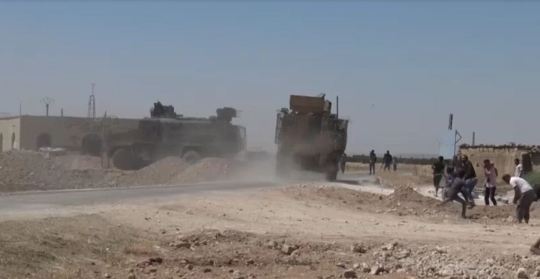
Joint Russian-Turkish patrols are an integral part of ensuring the security of many parts of Syria. In the province of Idlib, a patrol protects against illegal actions and protects local residents from terrorists who travel along the newly-opened M 4 highway, which ensures the province's stable connection with the rest of the Syrian regions. Similar tasks are performed by Russian and Turkish troops on the eastern bank of the Euphrates River, protecting the local, mainly Kurdish, population from the attack of bandits.
The fact that not everyone equally approves this event is quite logical. In Idlib province, the local population has been under the influence of terrorist propaganda for too long, and therefore they don’t know what the patrols are for, what goals they are pursuing, and their understanding of the role of Russia and Turkey in Syria has been shaped by radicals whose plans to seize vast territories of the Syrian Arab Republic fiasco, largely due to the interaction of these two countries. The same is in the east of the country. However, instead of propaganda of terrorists, the information impact and US dollars have a significant influence on the minds of the local population. At the same time, to intensify propaganda, as has already been said more than once, a detachment of psychological operations by the US Army arrived in the eastern provinces of Syria about two months ago. The unit’s tasks include organizing civilian protests, blocking patrols, disrupting the delivery of humanitarian aid to Russia and official Damascus to residents. In other words, there is every hindrance to the peacekeeping activities of Russia, and, according to a number of agreements, Turkey, in Syria. Moreover, the Americans use the units of the Assayish Kurdish security service for their purposes, which should, under the guise of local residents, implement the above measures.
On July 2, 2020, an incident occurred that fully demonstrates the results of the work of the American psychological operations units, the Assayish Kurdish security service, as well as the residents they hired, who, driven to desperation by the tyrannical policies of the local pro-American authorities, are ready to take any step for a modest reward. And just such a step was taken during the joint Russian-Turkish patrol in the area of the village of Kobani. During the movement of the column, local residents in several places blocked the military route with garbage, and also threw stones at their cars. The report turned out to be just wonderful, which instantly spread across social networks and a number of online publications. Moreover, Russian pilots who accompanied the movement of the convoy in combat helicopters, to the delight of the invited operators, during one of the maneuvers in the area of the village, shot heat traps, as can be seen in the video and photos being distributed. However, the Kurdish journalists of the ANHA news agency, in order to increase the popularity of their article, immediately invented that the Russians dropped tear gas cylinders on peaceful protesters.
At the same time, those who prepared this provocation, as well as those who shot this report made a number of omissions. To begin with, cameras and journalists are placed exclusively in those places where protesters stand. Moreover, on one of the frames, three operators are clearly visible with video equipment placed on massive tripods. Taking into account the weight of such equipment, it is easy to imagine that they were placed there in advance, and the journalists knew exactly about the upcoming action, and its scenario in advance. The second nuance, which is worth special attention, is a news agency report on the dumping of tear gas cylinders from Russian helicopters. I want to ask a question, why not with chlorine? Apparently they were afraid that the commission of the Organization for the Prohibition of the Proliferation of Chemical Weapons would immediately arrive at such a fake, which would immediately reveal this fraud. A tear gas does not seem to be worth such attention of the world organization. But enough for the scandal. However, the journalists who wrote about the use of gas by Russian pilots did not take into account the fact that no modification of Russian helicopters includes devices for dropping chemical ammunition, especially those that provide patrols. What journalists mistook for tear gas checkers is thermal traps that protect the helicopter from attack from rocket launchers from the ground. And the fact that the Russian pilots shot them over the village is quite logical. According to all the rules that are followed not only by Russian, but also by American and Turkish pilots, they are obliged to fly over the settlements, flying heat traps, since it is almost impossible to see a terrorist with a portable anti-aircraft anti-aircraft complex in a city building in a timely manner.
The incident in Kobani is actually nothing more than a planned action by US psychological operations units operating in eastern Syria. Washington is extremely dissatisfied with the Russian military presence in the region and is ready to do whatever it takes to reduce Russia's growing influence in eastern Syria. At the same time, the position of the Russian Federation remains unchanged and nothing will force it to abandon its obligations to ensure the security of citizens of the Syrian Arab Republic.
0 notes
Text
After Syria attack, Trump welcomes Turkey’s Erdogan to White House
CLOSE

President Donald Trump reacts negatively during his press conference with the Turkish president about the impeachment testimonies.
USA TODAY
WASHINGTON – President Donald Trump heaped praise on Turkish President Recep Tayyip Erdogan during a day-long visit to the White House on Wednesday despite bipartisan concern that the authoritarian leader is sowing chaos in the Middle East.
As House lawmakers began public hearings to investigate Trump’s interactions with Ukraine, the president fully embraced another controversy weighing on his White House: His decision last month to withdraw U.S. troops from northern Syria, clearing the way for Turkey’s invasion into that country days later.
There was little sign Wednesday of the bipartisan criticism that has cropped up in response to Trump’s approach to Turkey. After a series of meetings, the president told reporters during an East Room press conference that he hopes to broker an agreement with Turkey that would significantly expand trade between the two countries.
“I’m a big fan of the president,” Trump said of Erdogan.
The meeting with Erdogan, in the works for weeks, allowed Trump to marshal some attention away from the impeachment hearings taking place on Capitol Hill, but it also renewed focus on an issue that has caused rebellion within his own party.
Autoplay
Show Thumbnails
Show Captions
Last SlideNext Slide
“Although I have expressed concerns about granting President Erdogan such an honor in light of his recent actions, I hope the meeting produces better behavior from this important NATO ally,” Senate Republican leader Mitch McConnell said earlier Wednesday. “I share my colleagues’ uneasiness at seeing President Erdogan honored at the White House.”
Both Democrats and Republicans have argued Trump’s decision to withdraw U.S. troops from Syria was a betrayal of the Kurdish forces that helped American troops fight the Islamic State, also known as ISIS. Trump dismissed those concerns Wednesday.
Trump said Erdogan, who has described many of the Kurds on the Turkey-Syria border as terrorists, has a “great relationship with the Kurds.”
Speaking to reporters, the president also sided with Erdogan over the question of Syrian refugees. He said Europe should help Turkey pay for the more than 3 million refugees who fled Syria during that country’s civil war.
Erdogan said Turkey had resettled 365,000 of those Syrian refugees into northern Syria. But many of them come from other parts of the country and some critics have suggested that by relocating them to northern Syria, Turkey is forcing Kurds, Christians and other minorities there to flee – essentially engaging in “ethnic cleansing.”
Trump did not answer a question from a Turkish reporter about whether he is planning to invite the leader of the Syrian Democratic Forces, General Mazloum Kobani, to Washington. Lawmakers in Congress have pushed for such a visit and Kobani tweeted that Trump had invited him.
“We’ll see what happens,” Trump said in response.
Trump invited a group of Republican senators to meet with Erdogan. Reporters whisked into the Oval Office to briefly witness the meeting saw Sens. Lindsey Graham, R-S.C.; Jim Risch, R-Idaho; Ted Cruz, R-Texas; Rick Scott, R-Fla.; and Joni Ernst, R-Iowa, sitting with the two leaders.
“The purpose of this meeting is to have an American civics lesson for our friends in Turkey,” said Graham, who has been highly critical of Erdogan and Trump’s decision to withdraw U.S. troops from northern Syria. “And there’s a pony in there somewhere if we can find it.”
Erdogan’s visit comes amid reports of clashes in Syria – and questions about whether Turkish-backed forces have engaged in ethnic cleansing and other atrocities. Turkey’s assault, along with the U.S. withdrawal from northeastern Syria, has prompted more than 180,000 civilians to flee the border areas, according to the United Nations.

President Donald Trump meets with Turkish President Recep Tayyip Erdogan in the Oval Office of the White House, Wednesday, Nov. 13, 2019, in Washington. (Photo: Evan Vucci, AP)
More: ‘It is a zone of death, and we’re complicit’: Why evangelicals are upset with Trump’s Syria policy
Although the United States brokered a cease-fire between Turkey and the U.S.-backed Syrian Democratic Forces, it’s not clear how well that is holding. According to the Syrian Observatory for Human Rights, fighting has continued this week between the SDF and forces loyal to Turkey. Russian and Syrian government troops have moved in to fill the power vacuum left by the U.S. withdrawal.
“The cease-fire is holding very well,” Trump said earlier in the Oval Office.
Trump did raise one major point of friction with Erdogan: Turkey’s purchase of a Russian-made missile system, the S-400. Turkey received delivery of the Russian weapons system this year, despite stern U.S. warnings against such a move.
The White House responded by canceling Turkey’s participation in the Pentagon’s elite Joint Strike Fighter program, saying the S-400 system could be used to collect sensitive data on the F-35 jet fighter program, making Turkey’s participation “impossible.”
Trump said Turkey’s decision had caused “very serious challenges for us.” The president is under pressure to impose stiff sanctions on Turkey for the S-400 purchase, as well as for its Syria attack. The House approved a biting sanctions bill last month aimed at crippling Turkey’s economy and punishing Erdogan personally by requiring an assessment of his net worth.
“We’ll be talking about it,” Trump said of the weapons purchase.
Contributing: David Jackson
Read or Share this story: https://www.usatoday.com/story/news/world/2019/11/13/after-syria-attack-trump-welcome-turkeys-erdogan-white-house/2563828001/
Sahred From Source link World News
from WordPress http://bit.ly/33RYupl
via IFTTT
0 notes
Text
Turkey and the Kurds: What goes around comes around

By James M. Dorsey
A podcast version of this story is available on Soundcloud, Itunes, Spotify, Stitcher, TuneIn, Spreaker, Pocket Casts, Tumblr, Podbean and Castbox.
Turkey, like much of the Middle East, is discovering that what goes around comes around.
Not only because President Recep Tayyip Erdogan appears to have miscalculated the fallout of what may prove to be a foolhardy intervention in Syria and neglected alternative options that could have strengthened Turkey’s position without sparking the ire of much of the international community.
But also because what could prove to be a strategic error is rooted in a policy of decades of denial of Kurdish identity and suppression of Kurdish cultural and political rights that was more likely than not to fuel conflict rather than encourage societal cohesion.
The policy midwifed the birth in the 1970s to militant groups like the Kurdish Workers Party (PKK), which only dropped its demand for Kurdish independence in recent years.
The group that has waged a low intensity insurgency that has cost tens of thousands of lives has been declared a terrorist organization by Turkey, the United States and the European Union.
Turkish refusal to acknowledge the rights of the Kurds, who are believed to account for up to 20 percent of the country’s population traces its roots to the carving of modern Turkey out of the ruins of the Ottoman empire by its visionary founder, Mustafa Kemal, widely known as Ataturk, Father of the Turks.
It is entrenched in Mr. Kemal’s declaration in a speech in 1923 to celebrate Turkish independence of “how happy is the one who calls himself a Turk,” an effort to forge a national identity for country that was an ethnic mosaic.
The phrase was incorporated half a century later in Turkey’s student oath and ultimately removed from it in 2013 at a time of peace talks between Turkey and the PKK by then prime minister, now president Erdogan.
It took the influx of hundreds of thousands of Iraqi Kurds in the late 1980s and early 1990s as well as the 1991 declaration by the United States, Britain and France of a no-fly zone in northern Iraq that enabled the emergence of an autonomous Iraqi Kurdish region to spark debate in Turkey about the Kurdish question and prompt the government to refer to Kurds as Kurds rather than mountain Turks.
Ironically, Turkey’s enduring refusal to acknowledge Kurdish rights and its long neglect of development of the pre-dominantly Kurdish southeast of the country fuelled demands for greater rights rather than majority support for Kurdish secession largely despite the emergence of the PKK
Most Turkish Kurds, who could rise to the highest offices in the land s long as they identified as Turks rather than Kurds, resembled Palestinians with Israeli citizenship, whose options were more limited even if they endorsed the notion of a Jewish state.
Nonetheless, both minorities favoured an independent state for their brethren on the other side of the border but did not want to surrender the opportunities that either Turkey or Israel offered them.
The existence for close to three decades of a Kurdish regional government in northern Iraq and a 2017 referendum in which an overwhelming majority voted for Iraqi Kurdish independence, bitterly rejected and ultimately nullified by Iraqi, Turkish and Iranian opposition, did little to fundamentally change Turkish Kurdish attitudes.
If the referendum briefly soured Turkish-Iraqi Kurdish relations, it failed to undermine the basic understanding underlying a relationship that could have guided Turkey’s approach towards the Kurds in Syria even if dealing with Iraqi Kurds may have been easier because, unlike Turkish Kurds, they had not engaged in political violence against Turkey.
The notion that there was no alternative to the Turkish intervention in Syria is further countered by the fact that Turkish PKK negotiations that started in 2012 led a year later to a ceasefire and a boosting of efforts to secure a peaceful resolution.
The talks prompted imprisoned PKK leader Abdullah Ocalan to publish a letter endorsing the ceasefire, the disarmament and withdrawal from Turkey of PKK fighters, and a call for an end to the insurgency. Mr. Ocalan predicted that 2013 would be the year in which the Turkish Kurdish issues would be resolved peacefully.
The PKK's military leader, Cemil Bayik, told the BBC three years later that "we don't want to separate from Turkey and set up a state. We want to live within the borders of Turkey on our own land freely.”
The talks broke down in 2015 against the backdrop of the Syrian war and the rise as a US ally of the United States in the fight against the Islamic State of the PKK’s Syrian affiliate, the People's Protection Units (YPG).
Bitterly opposed to the US-YPG alliance, Turkey demanded that the PKK halt its resumption of attacks on Turkish targets and disarm prior to further negotiations.
Turkey responded to the breakdown and resumption of violence with a brutal crackdown in the southeast of the country and on the pro-Kurdish Peoples' Democratic Party (HDP).
Nonetheless, in a statement issued from prison earlier this year that envisioned an understanding between Turkey and Syrian Kurdish forces believed to be aligned with the PKK, Mr. Ocalan declared that “we believe, with regard to the Syrian Democratic Forces (SDF), the problems in Syria should be resolved within the framework of the unity of Syria, based on constitutional guarantees and local democratic perspectives. In this regard, it should be sensitive to Turkey’s concerns.”
Turkey’s emergence as one of Iraqi Kurdistan’s foremost investors and trading partners in exchange for Iraqi Kurdish acquiescence in Turkish countering the PKK’s presence in the region could have provided inspiration for a US-sponsored safe zone in northern Syria that Washington and Ankara had contemplated.
The Turkish-Iraqi Kurdish understanding enabled Turkey to allow an armed Iraqi Kurdish force to transit Turkish territory in 2014 to help prevent the Islamic State from conquering the Syrian city of Kobani.
A safe zone would have helped “realign the relationship between Turkey’s Kurdistan Workers Party (PKK) and its Syrian offshoot… The safe-zone arrangements… envision(ed) drawing down the YPG presence along the border—a good starting point for reining in the PKK, improving U.S. ties with Ankara, and avoiding a potentially destructive Turkish intervention in Syria,” Turkey scholar Sonar Cagaptay suggested in August.
The opportunity that could have created the beginnings of a sustainable solution that would have benefitted Turkey as well as the Kurds fell by the wayside with Mr. Trump’s decision to withdraw US troops from northern Syria.
In many ways, Mr. Erdogan’s decision to opt for a military solution fits the mould of a critical mass of world leaders who look at the world through a civilizational prism and often view national borders in relative terms.
Russian leader Vladimir Putin pointed the way with his 2008 intervention in Georgia and the annexation in 2014 of Crimea as well as Russia’s stirring of pro-Russian insurgencies in two regions of Ukraine.
Mr. Erdogan appears to believe that if Mr. Putin can pull it off, so can he.
Dr. James M. Dorsey is a senior fellow at Nanyang Technological University’s S. Rajaratnam School of International Studies, an adjunct senior research fellow at the National University of Singapore’s Middle East Institute and co-director of the University of Wuerzburg’s Institute of Fan Culture
1 note
·
View note
Photo

Erkan Ozgen - Wonderland - 2016 (Until July 28 2019)
Artist Background:
Erkan Ozgen is a Kurdish video/artist, filmmaker, and photographer who was born in Mardin in 1971.
What to look out for + Thematic Analysis:
Wonderland is a film which is centered around Muhammed, who is both deaf and mute. He used to live with his family in a small town named Kobani, Northern Syria. This is his story of what he witnessed when he escaped.
Unlike other refugees, Muhamed was keen to communicate what he saw but unfortunately didn’t have all the tools to do so.
Muhammed’s performance strikes viewers alone with our bare sense and lets us question our own ethics and humanity.
He puts it into perspective the horrific events he would have witnessed. It also becomes apparent to spectators that these images are stuck in his mind as he is unable to express them even though he desperately tries in Wonderland.
At moments, we are able to see both the fear and frustration in his eyes as he eagerly tries to make Ozgen understand his ‘words and language’
Ozgen hopes that Muhammed’s message will inspire people to create a united voice during a time of conflict. For people like Muhammed who don’t possess a voice physically and culturally. Even though Muhammed has no voice, his story will not be forgotten.
Historical Context:
Kobani used to be in Northern Syria, when Muhammed lived there. Due to the intense conflict surrounding the area, today it is known as Rojova. Rojova became the center of attention on a worldwide scale upon its 107 days long resistance against disproportionately heavy attacks from ISIS which started in September 2014
-Dharsh
0 notes
Text
OC Art
Hello everybody! Life has been hectic and I haven't been able to post here in quite some time. However, I have just finished the second edit of my WIP, Testaments of the Green Sea. I'm currently waiting for my editor (that is my partner) to finish their own read over of the manuscript.
Way back before everything went haywire, I commisioned a piece from @faeporcelain. It turned out amazing but I somehow failed to ever actually post it here for y'all to see it!
This is their rendition of my two MC's Narul and Ninma. Please go check out some more of their things, I really enjoy their style.

I'm not there yet but when I am satisfied with my edits, I would love to find some beta readers.
And I would love discussing more about my story. Few things make me as happy as answering random story and worldbuilding questions. I used to post here relatively often, I might start doing that again if everything else in life permits it.
#fantasy#art#world building#queer fantasy#fantasy worldbuilding#fantasy writing#worldbuilding#oc character#writing#Seriously check out their page its great#fantasy world#Narul#TestamentsoftheGreenSea#kobani questions#if y'all have any questions please ask!
12 notes
·
View notes
Photo

Life under ISIS led these Muslims to Christ Four years have passed since the Islamic State group's fighters were run out of Kobani, a strategic city on the Syrian-Turkish border, but the militants' violent and extreme interpretation of Islam has left some questioning their faith.Read More
0 notes
Text
Defending Afrin
Turkey's war on Afrin is an attack not only on Kurdish self-determination, but on democracy and women's liberation in the Middle East.

Kurdish YPG fighters in Afrin, northern Syria. KurdishStruggle / Flickr
When thousands gathered in Afrin for the funeral procession of Barin Kobani, a woman fighter of the Kurdish Women’s Protection Units (YPJ), whose lifeless body was mutilated by Turkish-backed jihadist mercenaries, olive branches were reaching out of the crowd. Afrin, located at the Syrian-Turkish border and in the center of Mount Kurd, is not only known for its predominantly Kurdish population but also for its olive groves and blooming fields, surrounded by a mountainous landscape. For more than two weeks now Turkish tanks and fighter jets, accompanied by bearded men shouting “God is great” and raising their index finger, have been attacking civilian neighborhoods and positions held by the Kurdish-led Syrian Democratic Forces (SDF) in what Turkey has cynically named “Operation Olive Branch.”
According to a World Health Organization report, eighty-six civilians — including a whole family of seven — have been killed, along with two hundred wounded. More than ten thousand fled due to the bombings in one week. Kurdish sources such as the Administration of Afrin Canton Council and the head of the Afrin hospital however say the number is even higher. Turkish attacks in Afrin, which have also struck ancient sites, explicitly breach international law. Yet since the beginning of the first attacks on January 20, no outrage against this military aggression has been vocalized by a government or the international community.
“Kurds have no friends but the mountains” has become an easy refrain over the years to respond to the injustices the Kurdish people have been subjected to. But, after more than a century of atrocities, the Afrin assault still feels particular and urgent, an opportunity for meaningful solidarity before all democratic accomplishments in Northern Syria are destroyed by Turkey, her jihadist foot-soldiers, and the imperial powers. The Afrin crisis has emerged as an epitome of the region’s predicament and raises three fundamental questions: What is Turkey’s role in the historical oppression of Kurds in the region? Who today challenges them as the defenders of Afrin? And what are the geopolitics of the conflict?
Erdoğan’s Targets
Whenever the Turkish government launches an “operation,” especially an “anti-terror operation,” you can be certain that Kurds will be the first ones in the crosshairs. After the June 2015 elections, when Erdoğan’s Justice and Development Party (AKP) lost the majority it needed to form a government on its own, snap elections were announced for November 1. In the meantime, the peace process with the Kurdistan Workers’ Party (PKK) was terminated and a state of emergency declared in the country’s Kurdish southeast. The government, hand in hand with the military, launched so-called “cleansing operations” against supposed PKK members and targeted strongholds of the People’s Democratic Party (HDP), a left-wing alliance with its roots in Kurdish politics and effectively the only challenger of the AKP, in an act of collective punishment. A sizeable death toll and significant displacements were the consequence.
About this time two years ago, on February 5, the AKP government revealed a ten-step action plan to “repair” southeastern Turkey, which had been destroyed in the wake of the siege (or, as then-Prime Minister Ahmet Davutoglu would have it, was “traumatized by terrorists who started the fire”). This post-operation “master plan” included consultations with village guards that function as pro-government militia and the construction of bulletproof security towers in urban districts. It was, in reality, just another phase of the warfare, an attempt at tearing local residents from their historically inhabited spaces and creating obedience....
Continued:- https://www.jacobinmag.com/2018/02/afrin-kurdistan-syria-turkey-erdogan-is-war
22 notes
·
View notes
Photo
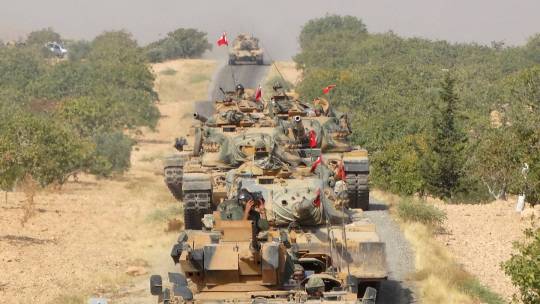
The new point of clashes on the map of Syria is Ain Isa. The town, located east of the Euphrates River in the north of the country, has been fighting for some time between the Turkish-backed Syrian National Army, which consists of jihadist groups and the SDF. Ain Issa was one of the targets of the operation called "Source of Peace", carried out by the Turkish authorities in 2019.
First of all, Ain Isa is one of the important points on the strategically important M-4 highway, which stretches from Latakia to Aleppo, and from there runs to Qamishli and connects northern Syria with the Iraqi border. And now Ain Isa, located on this highway, serves as an important intersection connecting Manbij and Kobani, Hasakeh and Qamishli.
The location of Ain Issa also provides an answer to the question of why jihadist groups in the "Syrian National Army" (SNA) with the artillery support of the Turkish Armed Forces attack this settlement. If this strategic intersection on the M-4 highway can be taken under control, another of the most important junctions of the autonomous region under the control of the SDF in north-eastern Syria will be cut off. In other words, the choice of Ain Issa as a target makes sense as an operation aimed at dividing Rojava. But the most important thing is the opportunity to increase the smuggling of oil from the Syrian fields.
0 notes
Text
U.S. Envoy in Syria Says Not Enough Was Done to Avert Turkish Attack https://nyti.ms/2K155pw
🔥🔥🔥🔥🔥🔥🔥🔥🔥🔥🔥🔥🔥🔥
U.S. Envoy in Syria Says Not Enough Was Done to Avert Turkish Attack
In an internal memo, the senior American diplomat in northern Syria criticized the Trump administration for failing to try harder to deter Turkey from invading northern Syria last month.
By Eric Schmitt | Published Nov. 7, 2019 Updated 4:21 PM ET | New York Times | Posted November 7, 2019 |
WASHINGTON — The top American diplomat on the ground in northern Syria has criticized the Trump administration for not trying harder to prevent Turkey’s military offensive there last month — and said Turkish-backed militia fighters committed “war crimes and ethnic cleansing.”
In a searing internal memo, the diplomat, William V. Roebuck, raised the question of whether tougher American diplomacy, blunter threats of economic sanctions and increased military patrols could have deterred Turkey from attacking. Similar measures had dissuaded Turkish military action before.
“It’s a tough call, and the answer is probably not,” Mr. Roebuck wrote in the 3,200-word memo. “But we won’t know because we didn’t try.” He did note several reasons the Turks might not have been deterred: the small American military presence at two border outposts, Turkey’s decades-long standing as a NATO ally and its formidable army massing at the Syrian frontier.
MR. ROEBUCK’S WORDS( I posted it below)
Read the full memo.
In an unusually blunt critique, Mr. Roebuck said the political and military turmoil that upended the administration’s policy in northern Syria — and left Syrian Kurdish allies abandoned and opened the door for a possible Islamic State resurgence — was a “sideshow” to the bloody, yearslong upheaval in Syria overall.
But, he said, “it is a catastrophic sideshow and it is to a significant degree of our making.”
Mr. Roebuck, a respected 27-year diplomat and former United States ambassador to Bahrain, sent the unclassified memo on Oct. 31 to his boss, James F. Jeffrey, the State Department’s special envoy on Syria policy, and to about four dozen State Department, White House and Pentagon officials who work on Syria issues. Mr. Roebuck is Mr. Jeffrey’s deputy.
The New York Times obtained a copy of the memo from someone who said it was important to make Mr. Roebuck’s assessment public. Mr. Jeffrey and Mr. Roebuck declined to comment on Thursday.
Morgan Ortagus, the State Department spokeswoman, also declined to comment on Mr. Roebuck’s memo. “That said, we have made clear that we strongly disagreed with President Erdogan’s decision to enter Syria and that we did everything short of a military confrontation to prevent it,” Ms. Ortagus said in a statement on Thursday.
“No one can deny that the situation in Syria is very complicated and there are no easy solutions and no easy choices,” she said. “There will always be a variety of opinions on how this complex situation should be managed. This administration’s job is to do what is best for U.S. national security and the American people. That is what we have done in Syria and what we will continue to do.”
Mr. Roebuck’s memo appears to be the first formal expression of dissent on Syria from a Trump administration official to be made public. Pentagon officials voiced alarm by the sudden shift in Syria policy, but top officials never made their views public.
Mr. Roebuck’s memo also comes as the president already has expressed disdain for some State Department officials because of their testimony in Congress during the impeachment inquiry over Ukraine policy.
For nearly two years, Mr. Roebuck has worked on the ground in northern Syria with Syrian Kurdish and Arab military and civilian officials who make up what is called the Syrian Democratic Forces. Mr. Roebuck has been an important interlocutor with Mazlum Kobani, the Syrian Kurdish military commander whose fighters have worked closely with American Special Operations forces to combat the Islamic State.
Mr. Roebuck focused his harshest criticism on Turkey’s military offensive and specifically on Turkey’s deployment of Syrian Arab fighters in its vanguard force. Mr. Roebuck added his voice to accusations by human rights groups that these fighters have killed Kurdish prisoners, including one of them lying on the ground with his hands bound behind his back, and committed other atrocities as they emptied major Kurdish population centers in northern Syria.
“Turkey’s military operation in northern Syria, spearheaded by armed Islamist groups on its payroll, represents an intentioned-laced effort at ethnic cleansing,” Mr. Roebuck wrote, calling the abuses “what can only be described as war crimes and ethnic cleansing.”
“One day when the diplomatic history is written,” he said, “people will wonder what happened here and why officials didn’t do more to stop it or at least speak out more forcefully to blame Turkey for its behavior: an unprovoked military operation that has killed some 200 civilians, left well over 100,000 people (and counting) newly displaced and homeless because of its military operation.”
Mr. Roebuck continued, “To protect our interests, we need to speak out more forcefully, publicly and privately, to reduce the blame placed on the U.S. and to highlight the Turkish responsibilities for civilian well-being.”
By acting now, Mr. Roebuck wrote, “we have a chance to minimize the damage for us and hopefully correct some of the impact of Turkey’s current policies, as we seek to implement the president’s guidance for our presence in northeastern Syria.”
A senior State Department official, who spoke on condition of anonymity to discuss diplomatic matters, told reporters on Wednesday that the United States had immediately raised the reports of atrocities with the Turkish government. Kurdish forces in Syria have made allegations of atrocities, which the Turkish government has denied.
But the senior official acknowledged that the Turkish-based Syrian force included ill-disciplined Arab fighters — the Arabs and Kurds have a history of sometimes bloody rivalry in the region — and that some embrace radical Islamic ideology.
Mr. Roebuck’s memo comes at a tumultuous time on the ground in northern Syria and at a delicate moment for the administration’s Syria policy. Mr. Jeffrey is scheduled to travel to Ankara and Istanbul for meetings on Friday and Saturday with senior Turkish officials and members of the Syrian opposition to the government of President Bashar al-Assad of Syria.
The memo came two weeks after Vice President Mike Pence agreed to a deal with President Recep Tayyip Erdogan of Turkey that accepted a Turkish military presence in a broad part of northern Syria in exchange for the promise of a five-day cease-fire, completing an abrupt reversal of American policy in the Syrian conflict. Mr. Pence hailed the agreement as a diplomatic victory for President Trump, calling it a “solution we believe will save lives.”
The memo also came about a week after President Vladimir V. Putin of Russia met with Mr. Erdogan in Sochi, Russia, to discuss how their countries and other regional players would divide control of Syria, devastated by eight years of civil war.
The negotiations cemented Mr. Putin’s strategic advantage: Russian and Turkish troops have taken joint control over a vast swath of formerly Kurdish-held territory in northern Syria. The change strengthened the rapid expansion of Russian influence in Syria at the expense of the United States and its Kurdish former allies.
Under criticism for abandoning the Syrian Kurds and ceding territory they once held to Syria, Turkey and Russia, Mr. Trump changed course yet again last month and approved the deployment of several hundred American troops to guard oil fields in eastern Syria against the Islamic State, even as hundreds of other American forces were withdrawing under Mr. Trump’s initial order.
Mr. Roebuck said the president’s decision salvaged an important part of the mission against the Islamic State and preserved some space on the ground for the Syrian Kurds to operate after they were forced to pull back from the border.
But the United States will pay a price, he wrote.
“The decision to stay is a good one, even if the ‘protection of the oil’ rationale plays into toxic Middle Eastern conspiracy theories that will need to be lanced with careful, sustained messaging reinforcing the truism that Syria’s oil is Syria’s and for the benefit of the Syrian people,” Mr. Roebuck wrote.
Mr. Roebuck is the second senior American official in the past week who has questioned whether the United States pressed hard enough with measures like joint American-Turkish ground and air patrols along the border, to avert a Turkish offensive into northern Syria. In an interview with Defense One, the Pentagon’s top Middle East policy official, Michael P. Mulroy, said, “We would have prevented the need for an incursion.”
The White House and senior administration officials have said that Turkey’s offensive was inevitable and that Mr. Trump’s decision to pull about two dozen Special Forces off the border prevented them from being caught in the cross-fire between Turkish forces and the Kurds.
Critics have said that Mr. Trump, in an Oct. 6 phone call with Mr. Erdogan, paved the way for the Turkish invasion by not pushing back hard enough on the Turkish leader’s threat of military action.
As critical as he was about Turkey, Mr. Roebuck praised the Syrian Democratic Forces as a stout and reliable partner that had suffered massive casualties. He said the group had helped defeat the Islamic State and lead American commandos to the hide-out of Abu Bakr al-Baghdadi, the ISIS leader, and had provided reasonably sound local governance as well as a relatively stable security environment.
It was not a perfect situation, Mr. Roebuck said, but it was working and allowed United States forces to operate there in low numbers and safely at very low cost. “It wasn’t a bad start,” he said.
At the end of his memo, Mr. Roebuck offered some diplomatic options, including maintaining relations with Turkey and making clear to Turkish leaders they will bear the brunt of the costs for the military operation.
He also advocated using what time the United States has left in northeastern Syria to help stabilize the situation for the Kurdish population. Mr. Kobani, the Syrian Kurdish commander, said in a Twitter message on Wednesday that the Syrian Democratic Forces were resuming counterterrorism, or CT, operations as well as helping secure the oil fields, which provide the Kurds badly needed revenue.
“President Trump has been clear and consistent about wanting to get our forces out of Syria,” Mr. Roebuck concluded. “The residual presence to protect the oil and fight ISIS buys us some time.”
But he cautioned: “Our diplomacy will also need to recognize we — with our local partners — have lost significant leverage and inherited a shrunken, less stable platform to support both our CT efforts and the mission of finding a comprehensive political solution for Syria.”
🔥🔥🔥🔥🔥🔥🔥🔥🔥🔥🔥🔥🔥🔥
Read the Memo by a U.S. Diplomat Criticizing Trump Policy on Syria and Turkey
“Could we have stopped Turkey from coming in?” William V. Roebuck asked in an internal memo.
Published Nov. 7, 2019, 3:27 PM ET | New York Times | Posted Nov. 7, 2019 |
In an internal memo, the senior American diplomat in northern Syria criticized the Trump administration for failing to try harder to deter Turkey from invading northern Syria last month.
Below is the complete text of the memo written by William V. Roebuck, as obtained by The New York Times.
Subject: Present at the Catastrophe: Standing By as Turks Cleanse Kurds in Northern Syria and De-Stabilize our D-ISIS Platform in the Northeast
Assessment attached.
Drafter: wr
Present at the Catastrophe: Standing By as Turks Cleanse Kurds in Northern Syria and De-Stabilize our D-ISIS Platform in the Northeast
Summary: Turkey’s military operation in northern Syria, spearheaded by armed Islamist groups on its payroll, represents an intentioned-laced effort at ethnic cleansing, relying on widespread military conflict targeting part the Kurdish heartland along the border and benefiting from several widely publicized, fear-inducing atrocities these forces committed. Our military forces and diplomats were on the ground in the northeast at the time. The Turkey operation damaged our regional and international credibility and has significantly destabilized northeastern Syria. It also continues to place Kurdish society in northeastern Syria — as a people on ancestral lands — in serious jeopardy. We should insist Turkey bear all the diplomatic and reputational costs for this venture and seek to prevent President Erdogan from flooding this de-populated zone with Syrian Arab refugees in Turkey. Our diplomacy will also need to recognize we — with our local partners — have lost significant leverage and inherited a shrunken, less stable platform to support both our CT efforts and the mission of finding a comprehensive political solution for Syria. End Summary.
US INTERESTS IMPLICATED IN TURKEY’S ACTIONS
Ever since President Trump’s withdrawal announcement, together with the reaction, and the eventual settling on keeping a residual US presence to protect the oil and fight ISIS, there has been no shortage of analysis about the costs and benefits for the U.S. withdrawal. The potential damage to U.S. credibility was much discussed and seemed to help shape where our policy eventually ended up. But so far overlooked in the current context is an additional factor which has great potential for negative impact in damage to U.S. credibility: what can only be described as war crimes and ethnic cleansing. As more news emerges from northeast Syria of Turkish/Turkish supported groups/organizations (TSO) atrocities and expulsion of citizens, the reputational risks to the US and criticism of our decisions will rise. To protect our interests, we need to speak out more forcefully, publicly and privately, to reduce the blame placed on the US and to highlight the Turkish responsibilities for civilian wellbeing. By acting now, we have a chance to minimize the damage for us and hopefully correct some of the impact of Turkey’s current policies, as we seek to implement the President’s guidance for our presence in northeastern Syria.
STARTING AT THE BEGINNING
As the lone U.S. diplomat on the ground in northeastern Syria this last few weeks and one of the few in country over the past two years, I have worked closely with the SDF and its affiliated civilian institutions. I met regularly with SDF Commander General Mazloum and his lieutenants, as his forces cooperated with our Special Operations Forces against ISIS, as we took down their so-called Caliphate and administered a whipping that left their leadership dispersed and their ranks on their heels, running for cover or surrendering. I was present near Baghouz for the final days of the fighting and the SDF declaration of victory at Omar fields. I spoke with Mazloum just after the killing of Baghdadi this week, when he described the critical role SDF intelligence and planning played in the operation.
MEETING WITH THE COMMANDER
In our meetings, Mazloum would regularly provide updates on the joint U.S.-SDF pressure they were keeping ISIS under, including large back clearance operations of previously cleared territory and targeted operations to capture ISIS commanders and local leaders in sprawling, strategically located Deir a-Zour province. He described the uneven but relatively sturdy efforts to provide security and local governance in the northeast and recounted his regular outreach to Sunni Arab tribal leaders in Deir a-Zour and Raqqa to maintain their support for the SDF and address their grievances. Strategic in his thinking, optimistic, and strong believer in the importance of the relationship with the United States, Mazloum never failed to impress visiting military officers, senior officials, and regional experts with his pragmatism and pronounced willingness to work with the U.S.
LOCAL GOVERNMENT REALITIES IN THE NORTHEAST
Over the past year and a half, I worked closely with local civil councils in Raqqa, Manbij, and Shedadi, and visited dozens of other local government bodies in smaller, far-flung locales all over the northeast, all of them relatively nascent organizations the SDF and its civilian affiliates set up to assist in the delivery of essential services and help communities take the first steps to recover from damage the war wrought in their areas. Many of these rickety little councils were out in Arab villages and townships barely worthy of being called population centers. But the SDF/SDC had organized security and local governance throughout the northeast and this chunk of Syria representing close to a third of the country’s total area, was secure and peaceful for the most part.
These governance structures were flawed in some ways: they were not representative enough in many cases — particularly in Arab areas — and relied too heavily on Kurdish advisors usually affiliated at lower levels with the ruling PYD political party. But there was always the hope — and some limited evidence — these structures could evolve and become more representative, by including Kurds outside the PYD and more empowered, independent Arabs, and ultimately through holding free and fair local elections, when conditions permitted. Given the political models in the region the SDF had to work with, and given the ongoing civil war and fight against ISIS, it wasn’t a bad start. Kurds understood clearly they held more territory than their demographic and historic presence would normally suggest, but it was viewed as an important bargaining chip for them — and us.
TURKEY’S BORDER CONCERNS
In all the time I was in the northeast, since January 2018, I heard — and sometimes delivered — points that articulated appreciation about Turkey’s legitimate security concerns regarding the border with Syria. And yet that border stayed quiet on the Syrian side the entire time — over 20 months — I have been in Syria, until Turkey violated it with its October Peace Spring military operation. When quietly called on this discrepancy, a senior U.S. official explained to me, “well, it’s a perceived threat (because of ideological and other affiliations between the PYD and the PKK) that Turkey feels, so we have to take it seriously.” But eventually the talking point became reality. We began speaking as if there really were attacks across the border into Turkey, causing real casualties and damage. But these were chimerical — strongly felt perhaps — but palpable only as fears and concerns, not on the ground.
Meanwhile our SDF partners did everything they told us they would do to fight ISIS, and did it with motivation, impressive command and control, and ability to absorb casualties. They suffered over 10,000 fatalities and some 20,000 wounded. Not imagined casualties but truly dead young men and women and thousands suffering appalling, life-altering injuries.
OUR FIGHT WILL BE YOUR FIGHT
We asked these people to take on this fight. It was our fight, and Europe’s, and all of the international community’s. And yes, it was Syria’s Kurds’ fight too. They had fought ISIS to a standstill in Kobane and with our help back in 2014-2015, repulsed them. But we asked them to fight for us, for the international community, to put almost exclusively on their shoulders this burden of taking down what remained of the Caliphate. For their own reasons and calculations, they did so. One could argue that in a transactional sense, we owe them nothing. We looked after our interests and they made their own calculations.
But let’s be honest. They are a relatively small, largely local non-state actor. In some ways we, seeking a local partner to fight ISIS with us, may have inadvertently put a target on their back that did not exist before we came on the scene. At that time, while Turkey might have looked upon the PYD and its YPG militia as affiliated PKK organizations, it did not view them as an existential threat, the way Turkey has increasingly viewed them since they partnered with us. In 2015 senior PYD officials like Saleh Muslim and Elham Ahmed visited Turkey, meeting with senior GOT officials. They were not labeled terrorists or subjected to the language of extermination or other harsh rhetoric. But our military partnership with the SDF, never accepted by Turkey, over time seriously riled the Turks and seems to have caused them to see the YPG militia, the backbone of the SDF, together with the PYD political party, as an existential threat. In tandem with internal political developments in Turkey that left Erdogan beholden to a far-right political party with visceral anti-Kurd tendencies, and gave him his own reasons to demonize Syria’s Kurds, the dynamic for the current tragedy was set in motion.
OPERATION PEACE SPRING: ETHNIC CLEANSING BY ANOTHER NAME
One day when the diplomatic history is written, people will wonder what happened here and why officials didn’t do more to stop it or at least speak out more forcefully to blame Turkey for its behavior: an unprovoked military operation that has killed some 200 civilians, left well over 100,000 people (and counting) newly displaced and homeless because of its military operation targeting Tel Abyad and Ras Ayn, but also Kobane, and Ayn Isa, and dozens of Kurdish villages surrounding each of these towns. Using the threat and intense application of military force, much of it supplied by armed groups — Turkish Supported Organizations, or TSO, some of whom formerly allied with ISIS or al-Qaida — Turkey has emptied or is emptying major Kurdish population centers and Turkish officials — led by President Erdogan speaking at UNGA in September — broadcast their intention to fill these emptied areas with Syrian Arab refugees currently in Turkey. This de-populating of Kurdish areas benefited from several well-publicized, fear-inducing atrocities the TSO committed in the early days of the military operation that accelerated civilian flight.
Let’s be clear: this is intentioned-laced ethnic cleansing; it is a war crime, when proven. The US government should be much more forceful in calling Turkey out for this behavior. We should also make much clearer to Turkey, in public and private statements and with the leverage we have at our disposal, that the people run out of their homes must be able to safely return. The TSO gangs must be withdrawn. And as President Trump himself warned in a similar context, we should take steps to re-impose economic sanctions if Turkey attempts to carry out its threat of flooding this area with refugees, outside of any UN-sanctioned process.
This gets to the issue of whether we promised the Kurds we would protect them against Turkey. And it is true we did not utter those words or make that specific commitment. When the attack on Afrin occurred last winter, we told people, based on Washington’s guidance to reassure our partners “We can’t do anything about Afrin (which Turkey and its jihadi mercenaries attacked last year, dispossessing 170,000 people) because we aren’t there; no troops or air power. But we are here in the northeast. We are your close partner. Afrin can’t happen here.”
SPEAKING OUT
But it has happened. And on a much larger scale, as the US and its forces and its small diplomatic contingent — partners to the SDF — stood by and watched. We know in detail what has been done and continues to be implemented. That presence, our partnership with the SDF, and our close relations with Ankara make it incumbent on us to speak out if we are to place the blame for abuses where it lies and avoid risking damage to US credibility and reputation.
THE NEW SITUATION
The situation is not over. Observers who have seen these TSO in action — read their blood-curdling threats on social media against Kurds, and absorbed the publicly stated intention of Turkish officials to flood the area with Syrian Arab refugees — are warning that worse human rights violations are on the horizon. Beyond any specific war crimes or other abuses these groups might commit, the most wide-scale abuse — the clearing of widespread settled areas of an ethnic group and replacing it with another— partly implemented, partly still in the planning stages, must be placed on Turkey’s doorstep. And Turkey is forging ahead with a bold aggressiveness on the ground and in its rhetoric that has left the international community sputtering ineffectually.
PROTECTING THE OIL
We are now staying in the northeast with a residual force, to safeguard oil facilities and continue the fight against ISIS. The decision to stay is a good one, even if the “protection of the oil” rationale plays into toxic Middle Eastern conspiracy theories that will need to be lanced with careful, sustained messaging reinforcing the truism that Syria’s oil is Syria’s and for the benefit of the Syrian people.
THE NORTHEAST: SIDESHOW TO A CATASTROPHE
Viewing the current situation in a broader context, I do not say there were easy choices here in Syria and that we failed to make them because of ignorance or bad intentions or lack of resolve. U.S. policy makers, Coalition diplomats and their leaders, have done their best to contain the maelstrom that Syria has become. This situation on the northern border is in some ways a sideshow of that larger catastrophe. But it is a catastrophic sideshow and it is to a significant degree of our making.
COULD WE HAVE STOPPED TURKEY FROM COMING IN?
And we are here. Could we actually have prevented Turkey from coming in and wreaking havoc, with tougher bully pulpit diplomacy, blunter threat of sanctions and tactical adjustments of our limited forces, creating more observation posts on the border and beefed up patrols, making it difficult for Turkey attack without risking wounding or killing a U.S. soldier, something Turkey would be loathe do? As we did successfully last December when Turkey similarly threatened? It’s a tough call, and the answer is probably not, given our small footprint, Turkey’s NATO get-out-of-jail-free card, its looming proximity on the border, and the powerful, if misdirected, motivation it had to address its real terrorist threat from the PKK faced inside Turkey. But we won’t know because we didn’t try.
A FEW PROPOSALS FOR POLICY
The President’s recent decision to keep some US forces on the ground salvages an important piece of our effort against ISIS and it preserves operating space for the SDF. But the subsequent Russia-Turkey Sochi Agreement muddies any clarity to the situation on the ground; in tandem with Turkey’s Peace Spring operation and the SDF’s piecemeal deals to bring in Syrian regime and Russian forces in specific locations, the northeast has become a much less stable (and much smaller) platform for our D-ISIS mission. In some ways the SDF is living on borrowed time; what makes that potentially tragic is the sleight-of-hand Turkey has achieved, visiting its military solution not just on the SDF (with its acknowledged YPG backbone and that group’s diffuse ideological affiliations with the PKK) but on the innocent Kurdish population that lived in hundreds of villages in this northern area — along with Muslim and Christian Arabs — common people who live, farm, keep shops, and go to school in this border area.
What should we do, to shape our policy, given these complicated, painful realities?
1. Make clear to Turkey, publicly and even more bluntly, privately, that it will bear all the costs for its military operation. That includes the bill for our heavily damaged interests: the undercut fight against ISIS, the wrecking of our partner force, and the significant damage to our credibility as a partner in the region and beyond. In addition, Turkey should absorb the full brunt of international opprobrium for the ethnic cleansing it has perpetrated and demographic change it is yet threatening to do. At every turn we should make clear, Turkey and its leadership will be on their own in trying to justify these actions. And that we and the international community are carefully observing the fate of the remainder of Syrian Kurdish society — still on its lands in northern Syria but in significant jeopardy as Operation Peace Spring shows no sign of winding down.
2. Consider using our remaining time here in northeast Syria — as we fight ISIS — to stabilize the situation for the Kurdish population (and other populations living side-by-side with them) remaining in the north, help the SDF salvage a long-term platform to maintain the fight against ISIS and explore how it seeks to responsibly re-integrate into the Syrian State. That is a process that has already started, in a preliminary, slapdash manner, driven by Turkey’s military operation and our inability to find the policy levers to stop Turkey’s action. In addition to holding the oil fields, with the SDF, we hold other cards we can play, including the timing of our exit from the northeast and unblocking regional normalization and reconstruction funds at the appropriate time.
3. Acknowledge, and this will be a bitter pill to swallow, that the road to finding a solution in Syria probably leads through Moscow, at least in the first instance, rather than the UN. There may have been other options, more directly connected to UNSCR 2254 — and everyone involved in those efforts deserves credit for doing everything possible to achieve them — but Turkey’s Operation Peace Spring has so destabilized the northeast and devalued the leverage we had with our extensive presence and our once dominant SDF partners, that it is doubtful that road is open anymore, in any real sense. We can keep slogging on, and we probably will, letting the constitutional committee dynamics play out (with much less de-legitimizing impact on Assad than we expect) and possibly opening the way for elections in 2021, although probably with marginal impact on Assad’s rule.
4. Maintain the relationship with Turkey. Insisting an ally pay all the diplomatic and reputational costs — and even do restitution (in terms of allowing Kurds to return to their villages and homes) for a military operation that directly damaged our interests is not the same as dispensing with a valued bilateral relationship. Turkey sees no problem with pursuing its interests with vigor and even ruthlessness, regardless of the costs to us, even as it values its relationship to the US. This is the way the great game is played. And we need to play it just as aggressively with Turkey, while insisting on its rock-solid place in NATO and our strong bilateral strategic and commercial relationship.
5. Use our Residual Presence to Shape a Responsible Drawdown in Syria. President Trump has been clear and consistent about wanting to get our forces out of Syria. The residual presence to protect the oil and fight ISIS buys us some time. We hold other cards we can play, including the timing of our exit from the northeast and unblocking regional normalization and reconstruction funds at the appropriate time. A responsible drawdown will require an honest appraisal of our shrunken leverage — Operation Peace Spring forced us withdraw from half of the northeast and has seriously weakened our local partner — and a willingness to hold realistic conversations with the parties who exercise influence, including the SDF, Moscow, Ankara, and possibly even Damascus, to outline exactly how the northeast will be reintegrated into the Syrian state. Turkey, despite being the last remaining supporter of the Syrian opposition, is no doubt, already having these same conversations with Moscow and Damascus in order to resolve the Syrian conflict in its favor.
#trump scandals#trump administration#president donald trump#trump news#impeach trump#against trump#donald trump#white house#whitehouse#u.s. military#u.s. news#military#u. s. military#military intelligence#military dogs#politics and government#us politics#politics#house intelligence committee#state department#mike pompeo#mike pence#turkey#recep tayyip erdoğan#erdogan kurds#erdogan#syrianrefugees#syrian kurds#syria news#kurdsbetrayedbytrump
0 notes